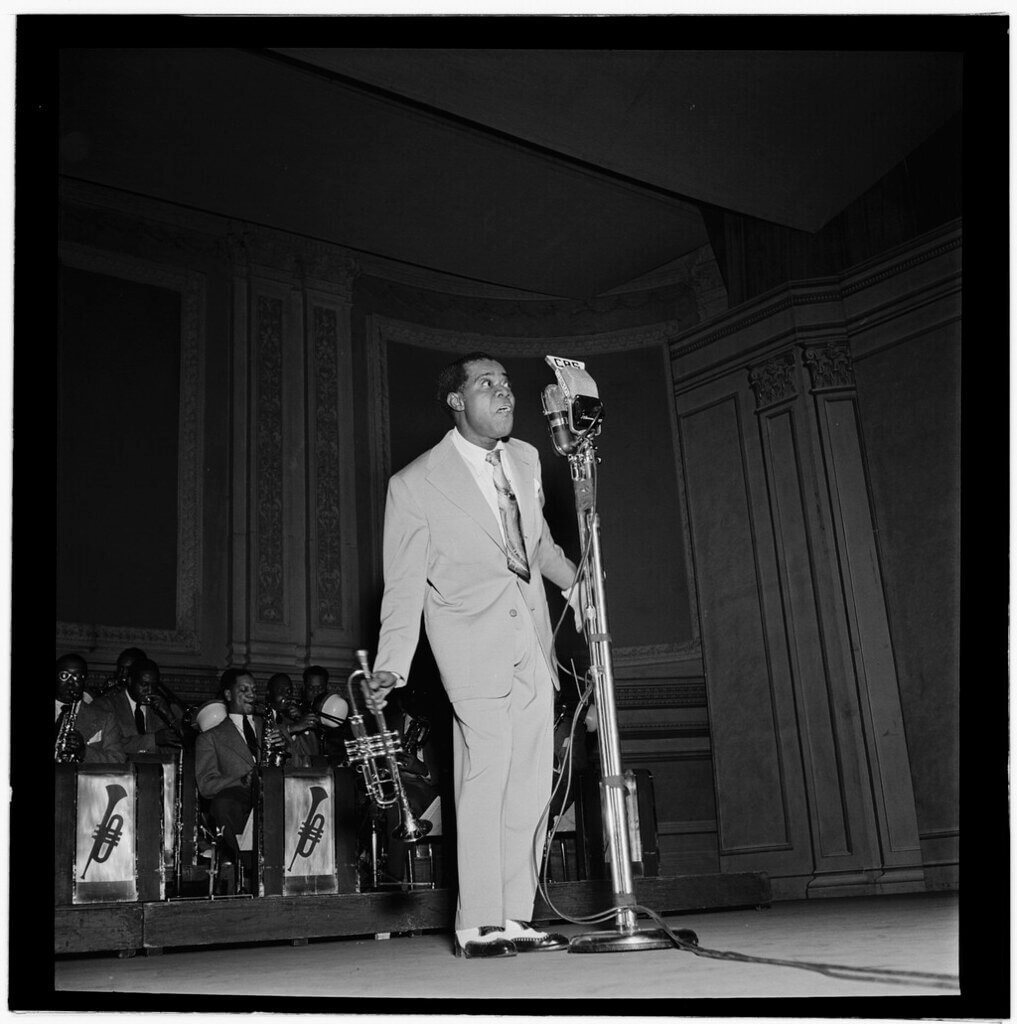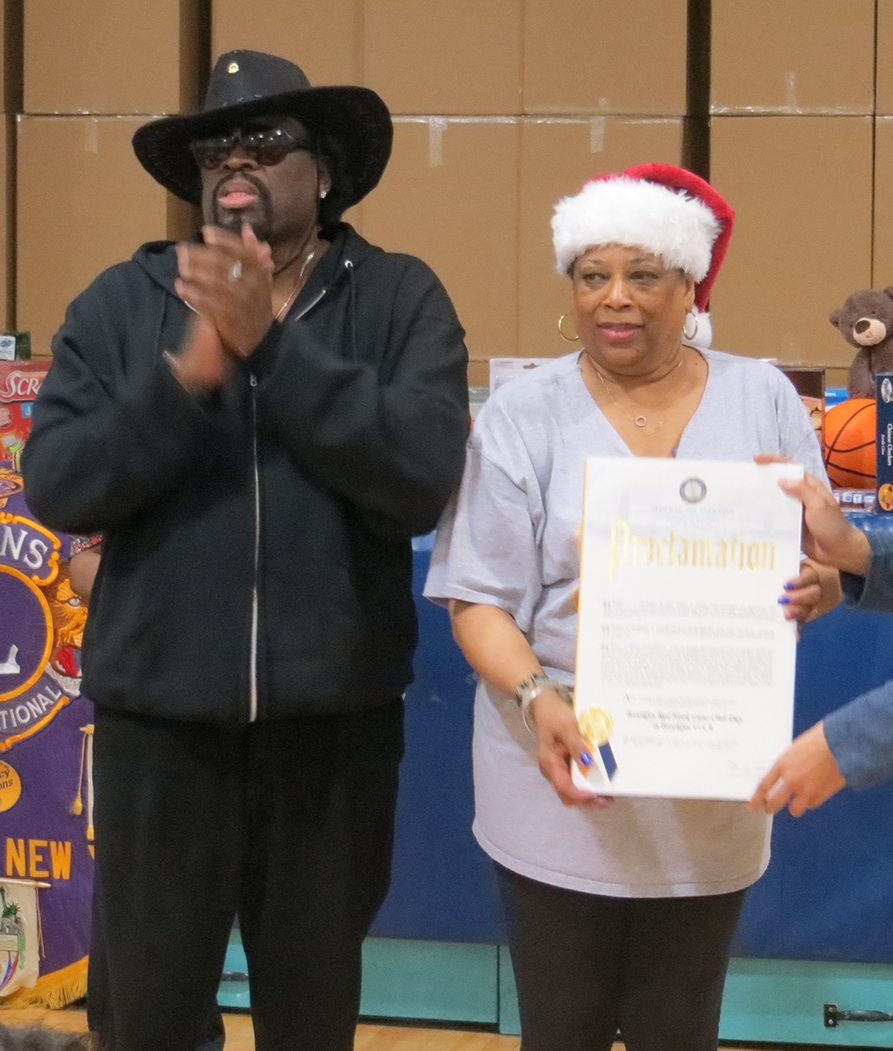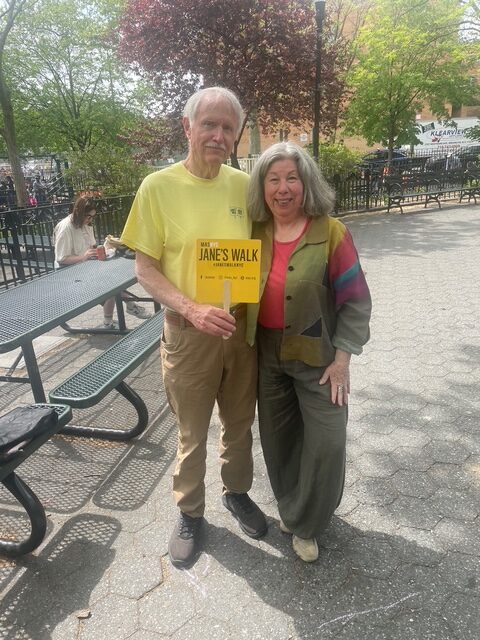Sometimes, things just come together. I’m writing this on July 4th, at the end of a long holiday weekend which saw the conclusion of the HBO series The Idol and, this day, the first of two birthday broadcasts on WKCR—89.9 on your FM dial, or wkcr.org if you insist—for Louis Armstrong. Yes, there are two birthday broadcasts for Louis, who was born in 1901 either on the 4th of July, which he claimed, or August 4th, the date that birth records indi-cate. Considering the status of Black Americans in New Orleans at the turn of the 20th cen-tury, barely two generations since the start of the Civil War, it’s in no way a stretch to doubt what state documents record and trust in what Louis had to say about his own life.
The symbolism is important. The Fourth is this country’s official birthday, and by 1776, Blacks, both enslaved and free, were already essential to the economic, political, and cul-tural foundations of this country. America as it is, and was, doesn’t exist without them. And American culture, particularly musical culture, doesn’t dominate the world as it has from the 20th century on without Black music in general and especially the singular figure of Armstrong, who all by himself pretty much created modern pop music. Louis, Pops, not just the OG Idol but the OG GOAT.
Without Louis, there’s no Abel Tesfaye, a/k/a The Weeknd, primer creator behind The Idol without the Idol. We can’t hold Louis responsible for every mistake and misadventure that has followed him in the field he created, and there’s a vast distance and difference be-tween Louis and The Weeknd, neither of which show the latter favorably. Beyond the self-indulgent, tawdry, puerile male-centric extended rape fantasy of The Idol —one of the worst things I’ve ever seen on television; despite its soft-porn sleaziness it was often so dull that I had to resort to imagine a Mystery Science 3000 dialog during many stretches—there’s the quality of the pop music made by The Weeknd himself. Armstrong launched the possibilities for pop music with enormous energy and humor, he subverted the conventions of popular song in the 1920s with a sense of freedom grounded in fantastic musical judg-ment and virtuosic skill.
The way The Idol plays out moment by moment, and especially the larger arc of the plot, if you want to call it that, is clearly about Tesfaye himself and meant to portray his ro-manticized self-image. With the caveat that the pop music marketplace is not only manufac-tured down to the nth degree in the way that songs are constructed to sell (which, if you go by the music on The Idol, is as clichéd, monumental, empty power ballads geared toward strip club audiences), this seems to be a profound public relations disaster. Tesfaye is a weak singer who clouds his songs in a sonic production that is like a dark gray Lexus coupe with tinted windows, acceptably sleek and bland and pretending that darkness hides mys-tery when the feeling is that it just hides hollowness. He’s a weaker actor, and an amateur-ish writer who lives in a world where the objects of his rape fantasies fall in love with him. It’s repulsive, and as a natural extension of his puerile songwriting, confirms the repulsive core of his music. I have no idea what Tesfaye’s politics are, but the politics of his music and of The Idol come through the fake rebellion, the self-regard, and the misogyny. He fits the profile of a Trump voter.
There’s segments on the show about music production, with the skilled producer Mike Dean subtly mocking the pretensions of Tesfaye’s character, and by extension the singer’s skills. Skill on an instrument, whether the trumpet or one’s voice, and skill with computer software may be on equal levels, but they are not the same thing. Digital Audio Work-stations like Pro Tools or Ableton Live are immensely powerful and offer deep and complex ways to manipulate sound if one is willing to put in the study and practice. But they are also fundamentally confining; a digital processor needs to put everything in an exact spot, so everything is quantized to a precise location on both a hard drive and in time. Music can’t spill over measures because measures are the bricks with which everything is built—anything that exceeds a measure just gets put into another one. There’s pre-defined pa-rameters for how tightly rhythms have to fit into quantization, which software makers de-fine as “swing” but is laughable in comparison to the way Armstrong could play or sing a solo with one sense of swing that pushed against the drummer’s compatible but different sense of swing.
Swing, the fundamental of jazz, is about how much individuals can play around with time inside a group that is bound together by a pulse. It’s play, it’s playful, spontaneous, ea-ger to see the next thing that happens, full of the possibilities of surprise. And that’s the thing about Armstrong. Listen to “West End Blues” and “Lazy River” dozens of times and you’ll know every note, and they’ll still sound surprising because it’s not just the sound but the magic of playing jazz that is captured on those recording. Armstrong died July 6, 1971 and he is still alive on every second of his recordings.
One thing I find bizarre is how dance-based pop music is so rhythmically dull and sounds so dead. Hear it once and it’s utterly predictable. Part of that is the idea that beats are something manufactured in a drum computer, rather than played, which on top of the quantization makes so much pop music boring. There’s no life there, not even to start, it’s all made via a processor The other component is that since the rhythms are so bland the baselines have to be exceedingly heavy and obtrusive. Can you actually dance to this? I mean, from Armstrong on, the beat in jazz is both much more light-footed and propulsive, because it’s pushing into the future, teasing with where it will land on the time line. There’s surprise involved, it’s fun!
Armstrong is also just fundamentally hip and Tesfaye and his style of music is funda-mentally square. Square thinking leads to square rhythms, sure, but so does manufacturing music in terms of what will sell. Sure maybe Pitchfork will dig it, especially if it’s a white critic writing about a Black musician who is outside the cultural world of the critic’s social circles, but selling like that is capitalism, and there is nothing on earth that is more square than capitalism. One of Armstrong’s final albums was Louis Armstrong and His Friends, and one of the tracks on it is Pharoah Sanders’ “The Creator Has a Master Plan.” I can think of a few contemporary pop artist who might be able to handle something on that level, someone like D’Angelo, but Tesfaye is not one of them. There’s freedom in that song that manufac-turing cannot simulate.
The freedom you hear in Armstrong and in the jazz that followed is freedom within a consensus, the idea of speaking your own voice and mind while being part of a larger socie-ty. That’s jazz as political and social theory, the tune is a set of laws that are formed by the consensus of those involved—the musicians—and playing with them together means form-ing a society through music. And if you can’t work with the band, well, you get fired.
The kind of pop music that Tesfaye makes sells is an idea of freedom that boils down to a licentiousness—very much pitched at an adolescent emotional and intellectual level—opposed to ideas of strict public behavior. Pop music has been pushing against those since even before Elvis—Armstrong did it!—and we’re long past the point where this has just been a commodification of fantasy, with all the revolutionary daring of putting a “Legalize Freedom/Outlaw Government” bumper sticker on your four-wheel drive SUV and then sit-ting in traffic on the expressway.
Celebrate freedom: listen to Louis.
Author
-

George Grella wrote the book on Miles Davis’ Bitches Brew. He write other stuff too. killyridols.substack.com/
View all posts
George Grella wrote the book on Miles Davis’ Bitches Brew. He write other stuff too. killyridols.substack.com/
Discover more from Red Hook Star-Revue
Subscribe to get the latest posts sent to your email.













